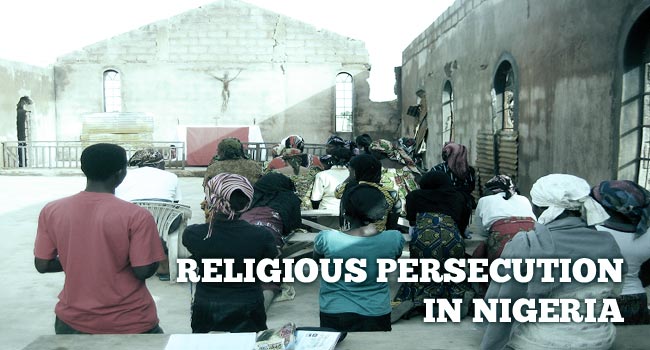Religious Persecution in Nigeria

The constitution of Nigeria stipulates that Nigeria is a secular state, it further guarantees religious freedom. However, this freedom has been abused severally in the country which has an estimated population of about 155-160 million. Nigeria, Africa's most populous country, is composed of Christian (51.26%), Muslim (45.12%), Ethno religionist (3.31%), Non-religious (0.30%), and other (0.01%) religious groups. The Northern divide largely hosts the Muslim population while the southern divide mainly comprises of Christian populations. The northern parts have witnessed a series of spontaneous sectarian attacks orchestrated by the Islamic and Christian groups. The repeated religious attacks in Nigeria are devastating and have had heart wrenching consequences including the brutal deaths, injuries, destruction of churches and the displacement of many.
Reports of prejudiced treatment towards Christians by the Northern ruling elite have been testified. The spasm of violence and bloodshed in the northern parts of Nigeria has reached alarming levels. Instances of violence begetting violence where Christians have killed Muslims and vice versa have escalated.
The presidency and the governance structure have also not been spared of the profound tension that exists between the Christian and the Muslim groups. After the April 2011 presidential election, protests over Christian Goodluck Jonathan winning quickly turned into ethnic and religious violence that saw hundreds killed. The Boko Haram, a radical Islamist group, which translates as "Western education is sin," called for the conversion of President Goodluck Jonathan or his resignation. Although Jonathan won the last election by a landslide, more than 800 people were killed and dozens of churches torched during three days of rioting after the election result was announced. Boko Haram has since threatened to cleanse northern Nigeria of its Christians by bombing their churches and attacking their congregations.
It is believed that Boko Haram has been attacking Christians in the north to incite sectarian violence between Muslims and Christians in order to press for the separation of the Muslim-majority north from the Christian-majority south.
The Boko Haram, are believed to have killed more than 690 people across the country this year alone.
Some of the recently reported cases are as follows:
- 27th September 2012: Three people were killed while 48 others were injured in a suicide bombing at a church in Bauchi Town, Nigeria.
- 1st October 2012- Boko Haram, an Islamic militant group, invaded the off-campus hostel of Federal Polytechnic College on October 1 and murdered up to 30 students. Gunmen reportedly rounded up the students and demanded to know their names. If they gave a Christian name, they were given a chance to deny their Christian faith and convert to Islam by reciting the shahada (Muslim prayer of faith). If they refused and stood firm in their Christian faith, they were either shot or stabbed to death on the spot.
- 14th October 2012 witnessed another deadly attack in northern Nigeria, this time more than fifty armed gunmen opened fire on Muslim worshipers as they were leaving a mosque in northern Nigeria, killing at least 20 people. The attack happened in a remote village called Dogo Dawa, in Kaduna state. However, this attack has been attributed to a feud between a group of "bandits" and a vigilante group in Dogon Dawa. The group had been robbing the residents. Any allegation that the attack had been sectarian was dismissed.
The government of Nigeria has been on the receiving end in the midst of all these attacks as it has been accused for failure/inability to combat the attacks taking place.


